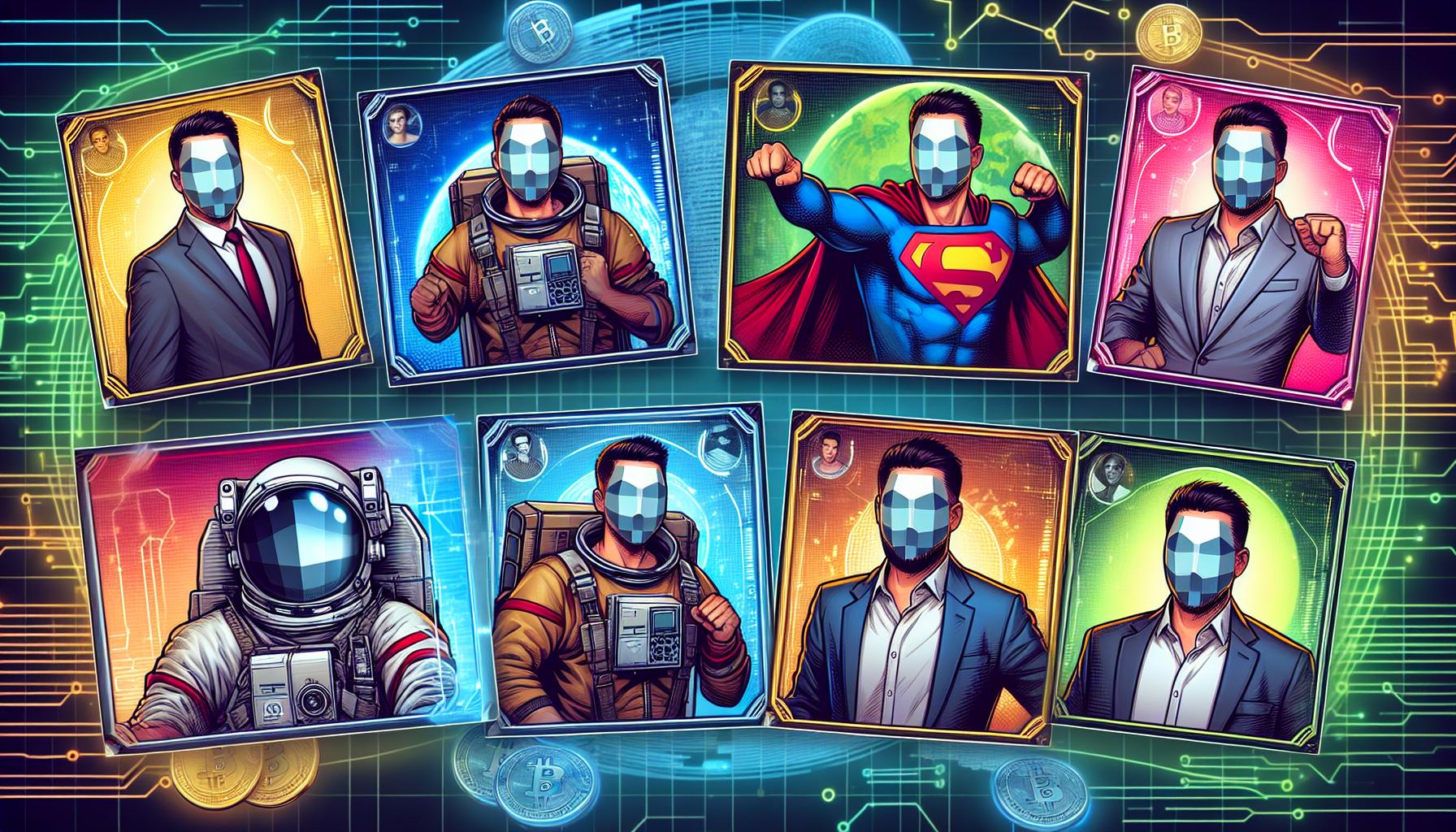Former President Donald Trump’s foray into the world of non-fungible tokens (NFTs) has sparked both intrigue and controversy. In December 2022, Trump launched his own digital trading card collection, featuring stylized images of himself in various heroic poses and costumes.
These NFTs, priced at $99 each, quickly sold out despite mixed reactions from supporters and critics alike. While some view this venture as a savvy business move, others see it as an unusual step for a political figure of Trump’s stature. As you explore the phenomenon of Trump NFTs, you’ll discover how they’ve impacted the intersection of politics, technology, and pop culture.
Key Takeaways
- Trump’s NFT collection, launched in December 2022, sold out quickly at $99 per digital trading card
- The NFTs feature stylized images of Trump in various poses, blending politics, technology, and pop culture
- These digital collectibles sparked controversy and criticism, raising legal and ethical concerns
- Trump NFTs significantly impacted political fundraising strategies and merchandise branding
- The success of Trump’s NFT venture may pave the way for more politicians to adopt blockchain-based digital collectibles
Understanding Trump NFTs: Digital Collectibles in the Political Sphere
Trump NFTs represent a unique intersection of politics, technology, and pop culture. These digital collectibles, launched by former President Donald Trump in December 2022, showcase stylized images of Trump in various heroic poses. Priced at $99 each, the collection quickly sold out, demonstrating the appeal of NFTs in the political realm.
The Concept Behind Trump NFTs
Trump NFTs are digital trading cards built on blockchain technology, ensuring authenticity and scarcity. Each NFT features a unique image of Trump, ranging from superhero-like portrayals to more traditional political imagery. The collection capitalizes on Trump’s persona and political brand, offering supporters a new way to engage with his image.
Impact on Political Merchandising
The introduction of Trump NFTs marks a significant shift in political merchandising strategies. Traditional campaign merchandise, such as hats and t-shirts, now competes with digital collectibles. This move highlights the potential for politicians to leverage emerging technologies to connect with supporters and raise funds.
Reactions and Controversies
Trump’s foray into NFTs sparked diverse reactions:
- Supporters: Viewed as an innovative way to support Trump’s political endeavors
- Critics: Questioned the appropriateness of a former president selling digital collectibles
- Tech enthusiasts: Recognized it as a mainstream adoption of blockchain technology
- Political analysts: Debated the implications for future campaign strategies
Market Performance and Value
The initial release of Trump NFTs saw rapid sales, with the collection selling out within hours. Market performance indicators include:
| Metric | Value |
|---|---|
| Initial Price | $99 |
| Total NFTs Sold | 45,000 |
| Initial Sales Revenue | $4.45 million |
| Secondary Market Average Price (24 hours after launch) | $684 |
These figures demonstrate the initial enthusiasm and market demand for Trump NFTs.
Broader Implications for Political Fundraising
Trump NFTs set a precedent for digital fundraising in politics. This venture raises questions about:
- The future of campaign finance
- The role of blockchain technology in political donations
- Potential regulatory challenges for crypto-based political fundraising
- The blurring lines between political support and digital investments
As politicians explore new fundraising avenues, Trump NFTs serve as a case study in the potential and pitfalls of merging politics with digital assets.
The Rise of Trump’s Digital Trading Cards

Donald Trump’s entry into the NFT market marked a significant shift in political merchandising and digital collectibles. This innovative approach blends politics, technology, and pop culture, creating a unique phenomenon in the digital asset space.
What Are Trump NFTs?
Trump NFTs are digital trading cards featuring stylized images of the former president in various heroic poses. These non-fungible tokens are built on blockchain technology, ensuring authenticity and scarcity. Each card is a unique digital asset that can be bought, sold, or traded on the blockchain, providing owners with verifiable ownership and provenance.
Key Features and Rarity Levels
Trump NFTs come with distinct features and rarity levels, enhancing their appeal to collectors:
- Limited Edition: The initial release consisted of 45,000 unique digital cards.
- Artwork Variety: Cards depict Trump in different personas, including superhero, astronaut, and cowboy.
- Rarity Tiers: NFTs are categorized into different rarity levels, from common to ultra-rare.
- Exclusive Perks: Some cards offer additional benefits, such as meet-and-greet opportunities or signed memorabilia.
- Blockchain Verified: Each NFT is authenticated on the blockchain, ensuring its uniqueness and ownership.
The rarity levels of Trump NFTs significantly impact their value and desirability among collectors. Ultra-rare cards, featuring exclusive artwork or special attributes, command higher prices in the secondary market. This tiered system creates a dynamic ecosystem where collectors actively seek out the most coveted cards, driving engagement and market activity.
Controversy and Criticism Surrounding Trump NFTs
The launch of Trump NFTs sparked significant debate and drew criticism from various quarters. This section examines the controversies and critiques associated with the digital trading card collection.
Legal and Ethical Concerns
Trump NFTs faced scrutiny over potential legal and ethical issues:
- Trademark infringement: Questions arose about the use of protected images and logos without proper authorization.
- Campaign finance violations: Critics argued the NFTs could potentially violate campaign finance laws if proceeds were used for political purposes.
- Conflict of interest: Concerns emerged about a former president profiting from his public image and political influence.
- Transparency issues: The lack of clear information about the allocation of proceeds raised ethical red flags.
Public Reception and Media Coverage
The Trump NFT collection received mixed reactions across various platforms:
- Social media backlash: Many users criticized the venture as a cash grab, mocking the artwork and concept.
- Supporter enthusiasm: Trump’s base largely embraced the NFTs, viewing them as collectibles and a way to support the former president.
- Media scrutiny: Major news outlets covered the launch extensively, often with skeptical or critical tones.
- Late-night comedy: The NFTs became fodder for late-night talk shows, further amplifying public awareness and criticism.
- Crypto community divided: While some praised the mainstream adoption, others viewed it as detrimental to NFT legitimacy.
The Trump NFT controversy highlighted the complex intersection of politics, technology, and public opinion in the digital age.
The Market Performance of Trump NFTs
The market performance of Trump NFTs has been a rollercoaster ride since their initial launch. These digital collectibles have seen significant fluctuations in value and trading volume, reflecting the volatile nature of both the NFT market and public sentiment towards the former president.
Initial Sales and Subsequent Trading
Trump NFTs made a splash in the digital collectibles market upon release. The initial collection of 45,000 cards sold out within 12 hours, generating $4.45 million in sales. The average price per NFT at launch was $99, but the secondary market saw prices soar to an average of $684 shortly after.
Trading volume on OpenSea, a popular NFT marketplace, reached $3.5 million within 24 hours of the launch. However, this initial excitement was followed by a sharp decline. Daily trading volume dropped to around $26,000 within a week, signaling a cooling of interest.
Factors Influencing Trump NFT Values
Several factors contribute to the fluctuating values of Trump NFTs:
- Rarity: Certain NFTs feature rare attributes or unique designs, driving their value higher.
- Political events: News cycles and political developments impact demand for Trump-related merchandise.
- Market sentiment: Overall NFT market trends affect Trump NFT values.
- Celebrity endorsements: Public figures’ comments on Trump NFTs influence their perceived worth.
- Blockchain technology: The use of Polygon blockchain for Trump NFTs affects their accessibility and trading costs.
The interplay of these factors creates a dynamic market where Trump NFT values can change rapidly. For example, during political rallies or significant announcements, trading volume often spikes. Conversely, negative press or market downturns can lead to sharp declines in both price and trading activity.
The Impact of Trump NFTs on the Political Landscape
Trump NFTs have significantly altered the political landscape, blending digital technology with traditional campaign strategies. This innovative approach has introduced new dynamics to political fundraising and branding, reshaping how politicians engage with supporters and raise funds.
Fundraising Potential and Campaign Strategies
Trump NFTs represent a novel fundraising method for political campaigns. By leveraging blockchain technology, campaigns can tap into a new demographic of tech-savvy supporters. This approach offers several advantages:
- Direct engagement: NFTs create a direct connection between politicians and supporters
- Transparency: Blockchain technology ensures transparent transactions
- Global reach: Digital assets transcend geographical boundaries
- Instant liquidity: NFTs can be quickly converted to cryptocurrency or fiat currency
Political campaigns utilizing NFTs can:
- Offer exclusive digital merchandise
- Create tiered supporter levels based on NFT ownership
- Provide unique experiences or access tied to NFT ownership
- Generate recurring revenue through secondary market sales
Influence on Political Merchandise and Branding
Trump NFTs have revolutionized political merchandise and branding strategies. This digital approach offers several advantages over traditional campaign merchandise:
- Scarcity: Limited edition NFTs create perceived value
- Collectibility: Digital assets can appreciate over time
- Interactivity: NFTs can include multimedia elements
- Customization: Easily tailored to specific campaign events or milestones
The impact on political branding includes:
- Enhanced digital presence
- Appeal to younger, tech-savvy voters
- Creation of virtual campaign rallies and events
- Establishment of long-term supporter communities
By embracing NFTs, political campaigns can create a more engaging and interactive brand experience, potentially attracting a broader base of supporters and donors.
The Future of Political NFTs and Digital Collectibles
Trump’s NFT venture has set a precedent for political figures leveraging digital collectibles, potentially reshaping campaign strategies and fundraising methods. As blockchain technology evolves, political NFTs are poised to become more sophisticated and integrated into campaign operations.
Political campaigns may increasingly use NFTs to:
- Offer tiered supporter levels with exclusive digital perks
- Create limited-edition digital memorabilia for key events
- Provide unique experiences tied to NFT ownership
- Generate recurring revenue through secondary market sales
The advantages of political NFTs include:
- Enhanced engagement with tech-savvy voters
- Increased transparency in campaign finance
- Global reach for fundraising efforts
- Instant liquidity for supporters
However, challenges remain:
- Regulatory uncertainty surrounding NFT-based campaign contributions
- Potential for market manipulation and price volatility
- Concerns about digital divide and accessibility
As the technology matures, expect to see:
- More politicians launching their own NFT collections
- Integration of NFTs with traditional campaign merchandise
- Development of blockchain-based voting systems
- Emergence of specialized platforms for political NFTs
The impact of Trump NFTs extends beyond individual campaigns, influencing the broader political landscape. Political NFTs represent a shift towards more interactive and personalized supporter experiences, blending digital innovation with traditional campaign strategies.
| Aspect | Traditional Methods | NFT-Based Approach |
|---|---|---|
| Engagement | Limited interaction | Direct, ongoing involvement |
| Revenue | One-time purchases | Potential for recurring income |
| Reach | Primarily local/national | Global audience |
| Authenticity | Easily replicated | Verifiable uniqueness |
As political NFTs gain traction, they’ll likely reshape how campaigns approach branding, fundraising, and supporter relations. The success of Trump NFTs serves as a case study for future political figures considering this innovative approach to campaign finance and supporter engagement.
Conclusion
Trump’s NFT venture has redefined political merchandising and fundraising. You’ve seen how these digital collectibles sparked debate and reshaped campaign strategies. As blockchain technology evolves, political NFTs are likely to become more prevalent.
The success and controversy surrounding Trump’s NFTs offer valuable insights for future political campaigns. You can expect to see more innovative approaches to supporter engagement and fundraising in the digital realm.
While challenges remain, the impact of Trump’s NFT launch on political discourse and campaign finance is undeniable. As you move forward, keep an eye on how this new frontier in political technology continues to develop and influence the political landscape.
Frequently Asked Questions
What are Trump NFTs?
Trump NFTs are digital trading cards featuring stylized images of former President Donald Trump in various heroic poses. These non-fungible tokens (NFTs) are built on blockchain technology, ensuring authenticity and scarcity. Launched in December 2022, each card was initially priced at $99 and quickly sold out.
How successful was the initial launch of Trump NFTs?
The initial launch of Trump NFTs was highly successful. The collection of 45,000 digital cards sold out within 12 hours, generating $4.45 million in sales. Shortly after launch, the average secondary market price reached $684, indicating strong demand for these digital collectibles.
What makes certain Trump NFTs more valuable than others?
The value of Trump NFTs is influenced by their rarity levels. The collection includes different tiers of rarity, with ultra-rare cards commanding higher prices in the secondary market. Other factors affecting value include the specific artwork, depiction of Trump, and any exclusive perks associated with the NFT.
What controversies surround Trump NFTs?
Trump NFTs have faced several controversies, including potential trademark infringement, campaign finance violation concerns, conflicts of interest, and lack of transparency regarding the allocation of proceeds. Critics have labeled the venture a cash grab, while supporters view them as valuable collectibles.
How have Trump NFTs performed in the market since their launch?
The market performance of Trump NFTs has been volatile. After the initial excitement and high sales, trading volume on platforms like OpenSea dropped significantly. Values fluctuate based on factors such as rarity, political events, market sentiment, celebrity endorsements, and overall NFT market trends.
What implications do Trump NFTs have for political fundraising?
Trump NFTs have reshaped political fundraising by blending digital technology with traditional campaign strategies. They raise questions about the future of campaign finance, the role of blockchain in donations, and potential regulatory challenges. This approach offers new ways for politicians to engage supporters and raise funds.
Are other political figures likely to follow Trump’s lead with NFTs?
Yes, Trump’s NFT venture has set a precedent for other political figures. As blockchain technology evolves, political NFTs are expected to become more sophisticated, offering tiered supporter levels, limited-edition memorabilia, and recurring revenue through secondary market sales. This trend could significantly impact future political campaigns.
What are the advantages of political NFTs?
Political NFTs offer enhanced engagement with tech-savvy voters, increased transparency in campaign finance, and global reach for fundraising efforts. They provide a new way to create unique, verifiable digital assets that can generate ongoing revenue and supporter interest beyond traditional campaign merchandise.
What challenges do political NFTs face?
The main challenges for political NFTs include regulatory uncertainty, market volatility, and potential public skepticism. There are concerns about how these digital assets fit into existing campaign finance laws and whether they could be used to circumvent donation limits or transparency requirements.
How might political NFTs evolve in the future?
As blockchain technology advances, political NFTs are likely to become more sophisticated. Future iterations may offer enhanced functionality, such as voting rights within digital communities, access to exclusive content, or even participation in policy discussions. This evolution could fundamentally change how campaigns approach supporter engagement and fundraising.






